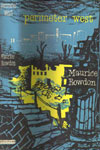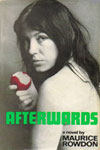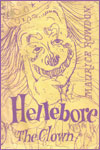Maurice Rowdon : Fiction
Perimeter West

William Heineman Ltd – London 1956 / Ringlinie West – S Fischer Verlag 1956
A parable of the Berlin ruins
Reviews
Excerpt
During these three years General Dessman had been Mayor, and he more than anyone was responsible for the building of the new city out of the ruins, for the electricity supply, for the cleaning of the sewers, for the quick demolitions, for the opening of schools and the university, for the institution of poor relief, for the charity camps in the forest at Lake End, for the opening of theatres and cinemas along Main Street, and for the restoration of the vast Technics factory on the east side of the canal. [Download PDF more... ]
to top >Afterwards

Barrie and Radcliffe – London 1967
An American publicity-agent sees Hiroshima as dividing history into the Before-The-Bomb and the afterward – the final step of dementia. The war to end all wars and dreams of the exploitation of space, thus foretelling fifty years of space-experiment by the USA and Britain.
Review
Excerpt
I’d just like to say this, Glen’, he murmured, suddenly moving close to me with energy, ‘I wrote this book Afterwards to save humanity in the event of a nuclear war, and that went all over the world as my advocating nuclear war. Now I wouldn’t mind if people knew what I meant by the Afterwards but they don’t. They think I mean after the bomb falls – in the future. But I don’t! I mean now. Remember what Macbeth said after his first murder – ‘From this instant there’s nothing serious in mortality’? And then he says, ‘All is but toys, grace and renown is dead’ (they weren’t too hot on their grammar in those days), ‘the wine of life is drawn’. [more.. ]
to top >Hellebore the Clown

Chatto & Windus – London 1953
A professional clown’s guilty encounter with his dead son’s closest friend, who had watched him die on the battlefield.
Reviews
Excerpt
It was a hill in Sussex during the early spring of 1907, at dawn. A group of actors stood on the crest with Hellebore, while the others strolled down to a path which crossed the valley. On the right of the hill was the road leading back to London, and waiting there at this moment were the four hackney carriages belonging to the company. The coachmen were gathered round the first carriage polishing wine-glasses and putting them on a large silver tray. [Download PDF more... ]
Published Stories
From Travels and Tales
No Enemy But Time: Harper’s Magazine
Adolf Hitler’s House: Cornhil
Miriam and the Road to Arezzo: Housewife
The Honest Cove: Oxford
to top >Fiction: Unpublished
How To Stop Dying In California 1984
A send-up of the personal growth therapies and a Lodestar fable. Love pulls the protagonists further and further away from each other until finally they are only ‘together’ thousands of miles apart.
Excerpt
As I made my way by stages to San Francisco (Alitalia from Rome to London, British Airways from London to San Francisco) I recalled the old Gold Rush song:
Oh Sally, dearest Sally
Oh Sally for your sake,
I’ll go to Californy
An’ try to raise a stake!
Dead Sunday: A Journey into the Underworld
Deceptively like a horror story with much action but it is constantly turning into something else. Coma or the real world? The protagonist loses track of which is which.
Excerpt
I knew every fitting in that apartment, though it was neither mine nor properly speaking an apartment. There were no windows or doors. A narrow arch in the wall led to the kitchen, bathroom and bedroom. At the end of a wide corridor there was a decompression chamber with a deep steel porthole-entrance. When closed and sealed this porthole became an elevator to the surface, to be used in the case of emergency or at the end of the operation. [Download PDF more... ]
to top >Night Fevers: Two Englishwomen in New York
Excerpt
Apparently what happened was that Anthea, after her arrival in New York – dressed in a Thirties cloche hat and a multiple pleated skirt that gathered at a tiny waist and billowed like a ballerina's tutu when she swung round (as she did when she turned a corner in the subway to run up the stairs) – went straight from the Village apartment she was about to share where the walls were naked brick and the bath squeezed into a corner of the kitchen, straight from there (I'm so feverishly eager to tell the tale I'm stumbling over my words) to the seventeenth floor office on Madison Avenue where Beatty Masumerov was – provided she hadn't forgotten the appointment – waiting for her.
Sophia the Wild
2010 note: Maurice wrote in 1974 ‘When the eye of wisdom (third eye) opens (ajna chakra) Shiva and Parvati lose their sexual nature and become a hermaphrodite. But beyond the ajna chakra, where the final bliss comes with the opening of the 1000 petalled lotus, sexuality may re-establish itself. In the Sahasrara they are in sexual union again.’
To an editor in 1976 he wrote: ‘This is a disguised Indian cult book about a hermaphrodite called Sophia and her affairs with other women. It plays between New York and an island in the southern Mediterranean. All the characters speak in the first person, and have to be identified by the reader solely through their style of speech. To young people familiar with words like kundalini, and accustomed to Indian disciplines it comes easy. But others don’t know where they are. It has been to Chatto, Cape (‘mostly impossible to understand, and dull when possible’—Tom Maschler), Constable (‘a commendable try, but no quarter is given to the reader’), Bodley Head (‘readers should protected against this kind of book’), Hutchinson and Goallancz. In the States Rosemary Macomber of Georges Borchardt said she could hardly try to place a book she couldn’t make head or tail of, but did try it at David’ Bolt’s request on Tony Godwin who turned it down.’
Review
Excerpt
After wandering many days I at last found myself between a woman’s legs, which is where all of us begin. It is worthwhile to remember this origin. They were a woman’s legs, not a man’s. I suppose all my life has been concentrated on that one fact. The woman whose legs I wandered into was a raw, long-haired peasant girl with eyes that glowered without the slightest light in them.
Under Construction
Janet
2010 note: David Bolt, his agent sent out, ‘Those who have read Rowdon’s previous novel Afterwards will know not to accept the surface of his books but to look for many more levels than the obvious one. There always lurks a dark and troubled world underneath, however logical the outward situation. Janet is a woman living in the green belt of a dormitory town near London. She ‘thinks’ as her husband says, ‘always thinking!’ And what she thinks uncovers the folly and craven mediocrity of the men round her, even her husband. The women are better, she thinks. And perhaps Ruth’s husband is better too. He has a job that takes him on the continent. He says they’re more civilized over there, that the English are barbarians. And f it makes her own husband more craven, with his evil-smelling ciagarettes. But it is he who acts. He changes – almost – into the man she wants. But not by ‘thinking’, as she finds out. Rowdon himself describes this books as the story of a bright woman in the land of philistines.
